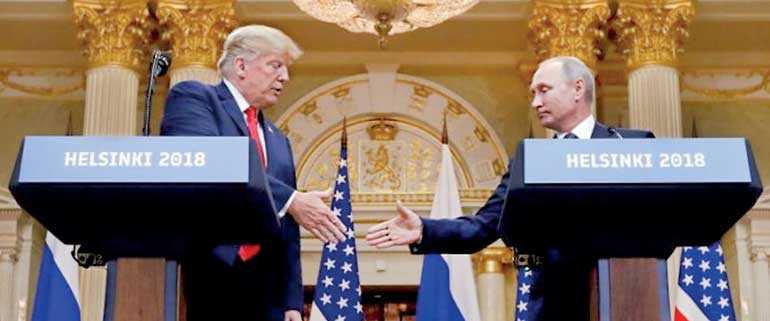Friday Feb 20, 2026
Friday Feb 20, 2026
Wednesday, 18 July 2018 00:00 - - {{hitsCtrl.values.hits}}
 HELSINKI (Reuters): US President Donald Trump’s week-long adventure on the world stage in Europe came to a raucous conclusion in Helsinki on Monday, with American allies fuming and confused and Russian President Vladimir Putin literally smiling at his good fortune.
HELSINKI (Reuters): US President Donald Trump’s week-long adventure on the world stage in Europe came to a raucous conclusion in Helsinki on Monday, with American allies fuming and confused and Russian President Vladimir Putin literally smiling at his good fortune.
Trump’s trip to Belgium, Britain and Finland was marked by his frequent taunts and threats aimed at America’s NATO allies, a sharp contrast to his unrestrained bid to curry favour with Russia despite the conclusion by US intelligence agencies that Moscow meddled in the 2016 US election to aid his candidacy.
Even for Trump’s high-drama, tweet-driven presidency, this was the most heavily criticised trip abroad of his 18 months in office. The only smooth sections were a tea at Windsor Castle with Queen Elizabeth – although he kept the nonagenarian monarch waiting and walked in front of her - and golfing at his own Turnberry course in Scotland.
In Brussels, Trump sowed confusion and chaos, blasting NATO allies for not contributing enough money for their own defence, then praising them for their contributions. He arrived 45 minutes late to the second day of meetings and hijacked the agenda.
In an insult aimed at German Chancellor Angela Merkel, Trump called Germany a “captive” of Moscow for its support of the Nord Stream 2 gas pipeline from Russia. Hours later, he said he has great relations with Merkel.
On to Britain, Trump tested the resolve of Prime Minister Theresa May in a critical week by telling a newspaper that one of her political opponents, recently resigned Foreign Secretary Boris Johnson, would be a great prime minister. The bombshell interview came out just after May had rolled out the red carpet to Trump for a gala dinner. Trump criticised the Brexit deal that she negotiated regarding Britain’s departure from the European Union, then called her a great leader who should do as she sees fit.
Allies had hoped that his “America First” bluster, trashing of Western leaders and questioning of the post-World War Two defence framework would not translate into permanent damage to relations.
A senior NATO diplomatic source, who was in the meetings at last week’s NATO summit, said the mood was grim in the wake of Trump’s visit but there was also relief that he did not force a change in policy.
“The expectations in Europe that Trump would mellow are behind us now, we no longer have those illusions. But we need to put constraints on this, we need less histrionics,” the source said.
Leslie Vinjamuri, head of the US and Americas programme at the Chatham House think tank, said Trump’s style of first criticising allies through tweets and then declaring publicly that all was well was part of a pattern that seemed intentional.
“The fancy term is multi-vocal signalling – in other words he sends messages out within the same half an hour, the same hour, and he’s speaking to different audiences. He’s very effective at it. Much of what he was doing on this visit was doublespeak,” Vinjamuri told reporters.
On the eve of his summit with Putin, Trump added insult to injury by calling the EU a “foe” for its trade policies in a CBS interview that aired on Sunday.
That language stood in stark contrast to the scene on Monday at Finland’s presidential palace, where Trump called the Russian leader, accused by the West of all manner of grievances, a “good competitor” and “I think the word competitor is a compliment.”
As Air Force One carried Trump back to Washington, he drew harsh condemnation from both Republicans and Democrats.
“Coming close on the heels of President Trump’s bombastic and erratic conduct towards our closest friends and allies in Brussels and Britain, today’s press conference marks a recent low point in the history of the American Presidency,” Republican Senator John McCain said in a statement.
The president’s critics pointed to Trump’s refusal to publicly criticise Putin, who again denied that the “Russian state” interfered in the US election and seemed puzzled by why the question kept coming up.
Always seeing the US investigation into Moscow’s interference as casting doubt on the legitimacy of his 2016 election victory, Trump said that while American intelligence blamed Russia, he gave credence to Putin’s “extremely strong and powerful” denial.
Trump left with no concrete achievements from his long-desired summit with Russia’s leader. Putin, who has been staring down American presidents since he rose to power in 2000, dismissed Trump’s concerns about Russia’s annexation of Crimea and gave vague promises to hold a dialogue about Syria and nuclear weapons.
The former KGB officer showed up late for the summit, held one-on-one talks with Trump for more than two hours and smiled and appeared to chortle when a reporter asked him whether Russia has compromising material from when then-businessman Trump visited Moscow in 2013 for the Miss Universe pageant.
At the end of the event, Trump left with a tangible gift: Putin handed him a soccer ball to mark Russia’s hosting of the World Cup. One US senator suggested Trump check it for listening devices and never let it enter the White House.